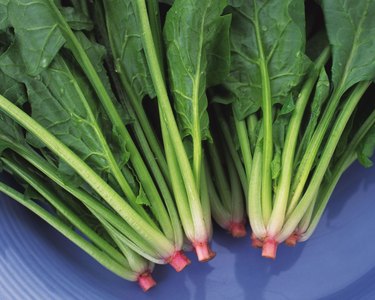
Spinach is a leafy green flowering plant that can be consumed in both raw and cooked forms. While consuming spinach in its raw state can often make it difficult to digest, the nutrients and vitamins that are preserved in this raw vegetable can actually help improve digestion in the long run. According to the University of Tokushima School of Medicine, glycoglycerolipids found in spinach can help protect the lining of the digestive tract.
Chewing
Video of the Day
Individuals who do not adequately chew the spinach they consume will often have trouble digesting and excreting the foliage. During the act of chewing, enzymes are released through your saliva which helps in the breakdown of spinach. While over-chewing your food will leave it tasteless, chewing spinach particles until they break down into smaller pieces will aid digestion. According to registered holistic nutritionist Kelly Reith, chewing food into small pieces makes it easier for the digestive juices in your stomach to fully coat the food, improving digestion and overall colon health.
Video of the Day
Blending
Whether spinach is a food you have a tough time chewing, or you simply cannot stand the taste of it, combining spinach with other food items through blending is a more palatable way to consume it. Since the first step of digestion begins with chewing, blending and chopping up spinach eliminates this step in your chain of consumption. If you do not like the taste of spinach, placing milk, ice, fruit and berries into a blender with the spinach will help you make a smoothie that masks the taste of the spinach. In addition to masking the taste, it fundamentally changes the texture of the spinach, making it easier to swallow and for your stomach to digest. In addition to smoothies, you can blend it with basil, pine nuts and olive oil to make a pesto that can be spread on other items you eat.
Cooking
While cooking spinach can potentially reduce the vitamin C levels in the plant, the act of steaming or boiling spinach can actually help preserve its antioxidants. If you do not like chewing and swallowing raw spinach, steaming and boiling the vegetable will soften the texture, making it easier to both chew and swallow, as well as naturally lubricate the vegetable through condensation. Frying or cooking your spinach in any substance, such as olive or cooking oil, will change the health benefits of the vegetable as well as alter the way in which your body digests the food. Adding fat and unhealthy oils to your spinach will only make it more difficult for your stomach to digest and process.
Repetition
According to the Hygiene Library Catalogue, making spinach a regular part of your diet will improve your body's ability to process and digest the foliage. If you are an individual who initially has trouble digesting raw spinach, try integrating it into meals several times a week. As your body adjusts to the unique texture and chemical makeup you will find a reduction in symptoms with respect to digesting and passing spinach. In addition, keeping spinach a regular part of your diet will help your digestive track get the full benefit of the glycoglycerolipids found in spinach.
Is this an emergency? If you are experiencing serious medical symptoms, please see the National Library of Medicine’s list of signs you need emergency medical attention or call 911.